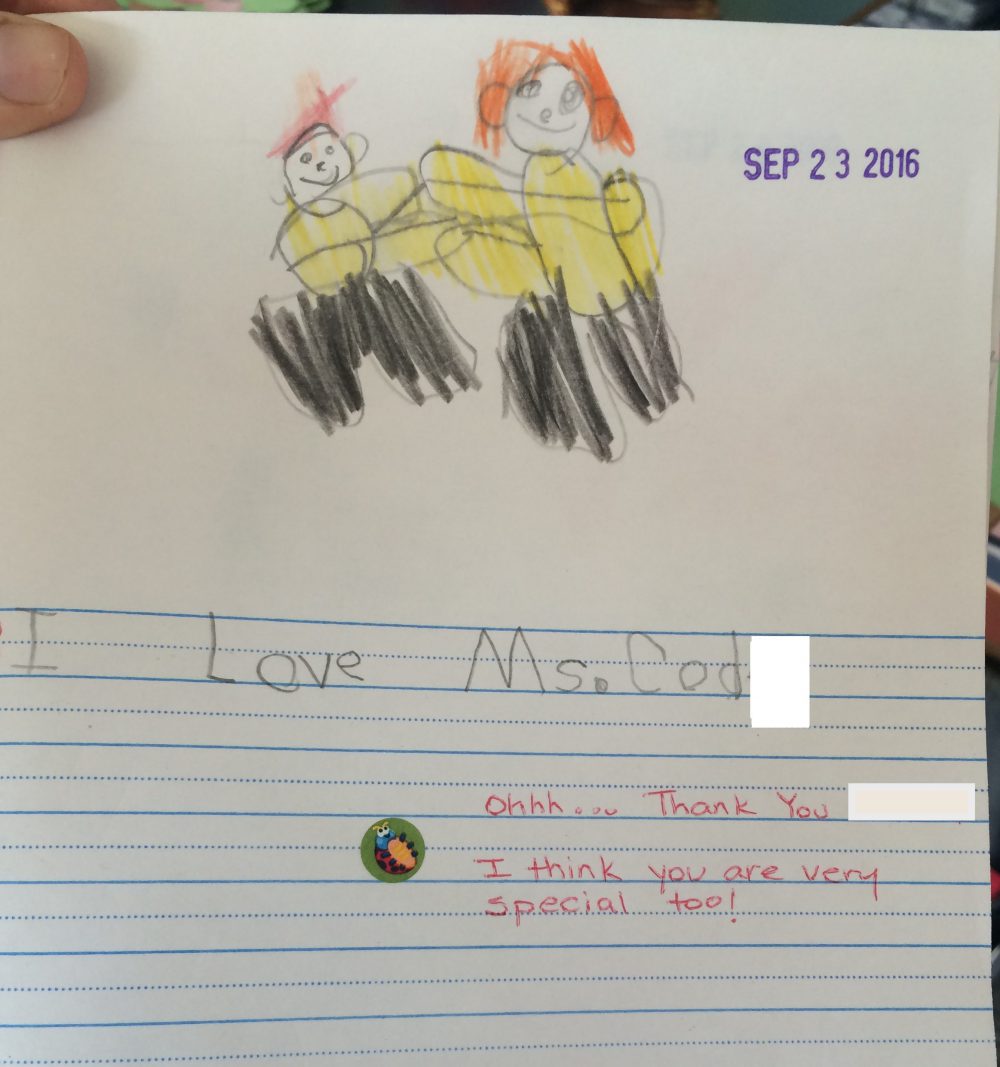The Teacher Has My Child’s Heart
With relief and delight my sister called me and said her 6 year old son had just drawn a picture of someone he loved – he drew his teacher of three weeks – Ms. Cod. Here is his lovely picture of the two of them together, side by side, with matching yellow bodies and black pants. Their arms are out stretched to embrace coupled with big smiles on their faces. The differences are obvious, Ms. Cod is bigger and she has orange hair and he has locks that are a darker shade of red. As if to cement the relationship, my nephew makes his intentions clear and writes, “I love you Ms. Cod.” His love does not to go unrequited as she lets him know she thinks he is pretty special too. While it is clear this teacher has my nephew’s heart, does she know what she will get along with it?
When a child attaches to their teacher it unlocks a powerhouse of characteristics that make a child teachable. When you have the heart of a child, you have the keys to unlock their mind and learning potential. Ms. Cod has much more than my nephew’s heart, she has the power to teach him.

The Characteristics of a Good Relationship Between a Teacher and Student
When a child is attached to their teacher they are inclined to follow them, listen, want to be the same as, talk like, be good for, inclined to agree with, take direction from, be open to influence from, and seek to measure up. The characteristics that make kids easy to teach for are the result of healthy attachment – not teaching style, technology, curriculum, or classroom space.
A mother asked me to help her understand why her 7 year old son was being sent to the Principal’s office repeatedly despite his good behaviour in kindergarten and grade one the previous year? I asked her if he liked his teacher and she said, “no, he really dislikes her and says he wants the teacher he had last year.” There are few if any disciplinary measures that are effective substitutes for a healthy relationship with a teacher.
The purpose of attachment is to facilitate dependence. It allows a teacher to lead with natural authority in the classroom and to take care of their students. It is their relationship that helps kids endure the hard parts of learning and the homework that is required. Attachment creates a sense of home, provides comfort, rest, and a place of retreat when the day is hard. To foster a child’s resilience at school we only need to work on their relationship with their teacher.
When a child is attached to a teacher they are easily commanded by them, guided and directed, as well as adopt and share their values. Kids want to stay close to teachers they like and will be steadfastly loyal to them. A strong relationship with a teacher helps a child feel safe at school and empowers teachers in their role.
Strategies for Cultivating Connections at School
The saying “it takes two to dance” is a good metaphor when considering the teacher and student relationship. The good news is both parents and teachers can play an important role in ensuring a child feels connected to their teachers.
How did this teacher win my nephew’s heart? My sister tells me she is both firm and caring in how she deals with her kids. She welcomes the students to class, has a twinkle in her eye when she sees them, as well as warmth in her voice. She connects with them throughout the day, she is patient and kind, and she doesn’t shame the kids when they are struggling in class. Ms. Cod has a way of holding onto her relationship with her little charges throughout the impasses that come up each day. She seems to know that the relationship is the most important thing to protect.
What can parents do to help the relationship between a teacher and student develop? They can matchmake their child to their teacher by pointing out similarities. It is a well known fact that we tend to like people that are like us! A child might also bring in something to show their teacher as a means of connecting with them as well as share their stories. A parent can show delight and warmth when talking about a teacher or when a child shares what happens at school. When a child sees their parent likes and trusts their teacher, that child is likely to follow suit.
On a last note I wish to send all the Ms. and Mr. Cod’s out there a heartfelt thank you. You bring relief to parents (and auntie’s too), when we know you have our children’s hearts. Kid’s learn best from the people they are attached to and we think you are pretty special too.
Dr. Deborah MacNamara is the Director of Kid’s Best Bet, a counselling and family resource center, on Faculty at the Neufeld Institute, and author of Rest, Play, Grow: Making Sense of Preschoolers (or anyone who acts like one). For more information please see www.macnamara.ca or www.neufeldinstitute.org.





